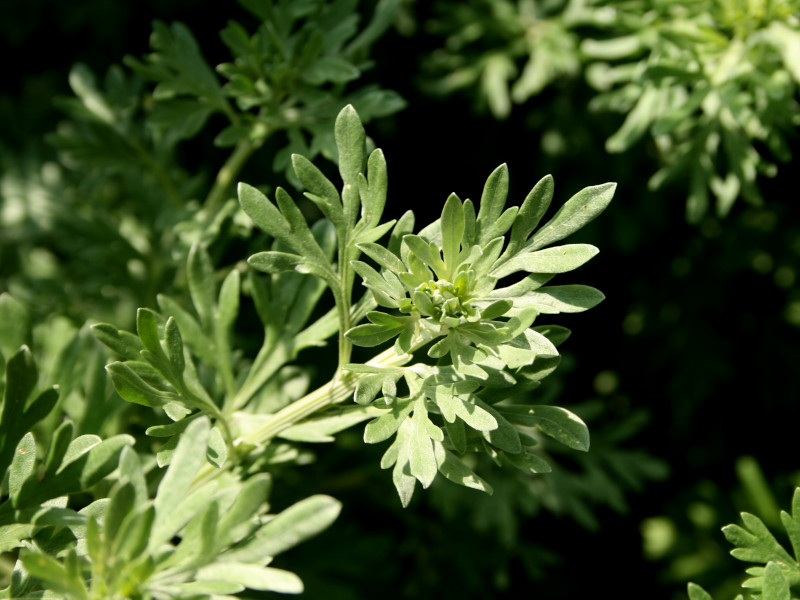Wise Mind Herbs
Evidence-based Herbal Healing
The information on this page has been prepared with reference to published scientific literature, not by a medically qualified expert. It is not medical advice. Any decision to use a supplement or herb-based product is your responsibility. Consult a suitably qualified medical professional, especially if you have underlying conditions. Remember, nothing is for everyone, and not everything sold is what it claims to be. Some things work for some people, some of the time.
Wormwood - Artemisia absinthium
Wormwood (Artemisia absinthium) is a perennial herb in the Asteraceae family with a long history of traditional use. This review examines the scientific evidence for its health applications, proper dosing, side effects, and pharmaceutical developments.

Botanical Classification and Common Names
Artemisia absinthium is commonly known as wormwood, common wormwood, grand wormwood, or absinthe wormwood. It should not be confused with other Artemisia species that have similar common names but different properties, including:
- Sweet wormwood (Artemisia annua) - Source of artemisinin, used in malaria treatment
- Roman wormwood (Artemisia pontica) - Milder variety used in vermouth production
- Sea wormwood (Artemisia maritima) - Coastal species with different properties
- Desert wormwood (Artemisia herba-alba) - Middle Eastern species used in traditional medicine
Therapeutic Applications Supported by Research
Scientific studies have identified several potential therapeutic applications for A. absinthium:
- Digestive disorders: Demonstrated efficacy for irritable bowel syndrome (IBS), dyspepsia, and functional dyspepsia
- Antiparasitic activity: Evidence for effectiveness against intestinal parasites including Ascaris lumbricoides and Enterobius vermicularis
- Anti-inflammatory properties: Reduction in inflammatory markers in both in vitro and in vivo studies
- Antimicrobial effects: Inhibitory action against several bacterial and fungal pathogens including Staphylococcus aureus and Candida albicans
- Hepatoprotective effects: Shown to reduce liver enzyme levels and oxidative stress in animal models
- Neuroprotective potential: Animal studies suggest possible benefits in neurodegenerative conditions
While traditional use suggests applications for fever, menstrual disorders, and as an appetite stimulant, these uses have insufficient clinical evidence to support definitive recommendations.
Dosage Recommendations and Standardization
Clinical studies have used varying preparations and dosages, making standardized recommendations challenging. The following ranges are based on available research:
- Dried herb: 2-3g daily, divided into 2-3 doses
- Liquid extract (1:1 in 25% alcohol): 1-2ml, three times daily
- Tincture (1:5 in 45% alcohol): 2-4ml, three times daily
- Standardized extract (standardized to 0.2-0.4% sesquiterpene lactones): 200-300mg, three times daily
For IBS symptoms, a proprietary extract (STW 5 or Iberogast) containing wormwood has been studied at 20 drops three times daily. Most clinical trials for digestive issues have used preparations standardized to contain specific levels of sesquiterpene lactones (particularly absinthin and anabsinthin) or essential oil components (thujone, chamazulene).
Side Effects and Safety Concerns
Wormwood contains thujone, a neurotoxic compound at high doses, leading to several safety concerns:
- Neurotoxicity: High doses may cause seizures, tremors, and nervous system excitation
- Gastrointestinal distress: Nausea, vomiting, and stomach pain reported in some individuals
- Allergic reactions: Reported in individuals with sensitivities to plants in the Asteraceae family
- Pregnancy and lactation: Contraindicated due to potential uterine stimulation and lack of safety data
- Drug interactions: May interact with medications metabolized by cytochrome P450 enzymes
The European Medicines Agency (EMA) and German Commission E recommend limiting thujone content to less than 0.1mg/kg body weight per day. The FDA restricts thujone-containing products in the US, with specific limitations for alcoholic beverages.
High-Dose Studies and Knowledge Gaps
Limited research exists examining doses above the standard therapeutic ranges. Animal toxicity studies suggest a dose-dependent relationship between wormwood consumption and adverse effects, particularly neurological symptoms. The therapeutic window appears relatively narrow, with beneficial effects observed within the dosage ranges provided above.
Significant knowledge gaps include:
- Long-term safety data on standardized preparations
- Comprehensive human pharmacokinetic studies
- Definitive mechanisms of action for many claimed benefits
- Optimal standardization parameters for clinical use
- Comparative effectiveness against conventional treatments
No high-quality studies have demonstrated additional benefits at doses exceeding standard recommendations, while toxicity risk increases substantially.
Conclusion
Scientific evidence supports limited therapeutic applications for Artemisia absinthium, primarily for digestive complaints and parasitic infections. The significant safety concerns and narrow therapeutic window necessitate careful consideration of its use. Standardized pharmaceutical preparations offer more consistent dosing than general supplements or herbal preparations. Further research is needed to fully characterize its therapeutic potential and safety profile.
References
Bhat, R. R., Rehman, M. U., Shabir, A., Rahman Mir, M. U., Ahmad, A., Khan, R., ... & Ganaie, M. A. (2019). Chemical composition and biological uses of Artemisia absinthium (wormwood). Plant and Human Health, Volume 3: Pharmacology and Therapeutic Uses, 37-63.
Boeing, T., de Souza, J., da Silva, R. D. C. V., Mariano, L. N. B., da Silva, L. M., Gerhardt, G. M., ... & de Souza, P. (2023). Gastroprotective effect of Artemisia absinthium L.: a medicinal plant used in the treatment of digestive disorders. Journal of Ethnopharmacology, 312, 116488.
Bora, K. S., & Sharma, A. (2011). The genus Artemisia: a comprehensive review. Pharmaceutical biology, 49(1), 101-109.
Lachenmeier, D. W. (2010). Wormwood (Artemisia absinthium L.)—A curious plant with both neurotoxic and neuroprotective properties?. Journal of ethnopharmacology, 131(1), 224-227.
Szopa, A., Pajor, J., Klin, P., Rzepiela, A., Elansary, H. O., Al-Mana, F. A., ... & Ekiert, H. (2020). Artemisia absinthium L.—Importance in the history of medicine, the latest advances in phytochemistry and therapeutical, cosmetological and culinary uses. Plants, 9(9), 1063.